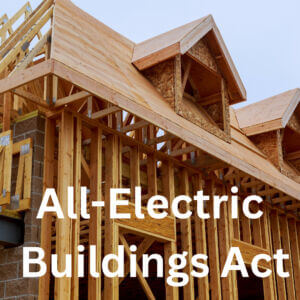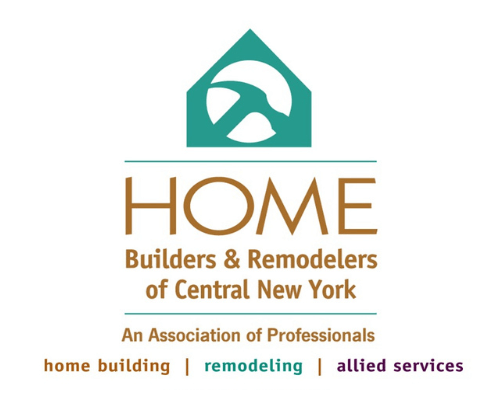* NYS Postpones All Electric Building Act - syracuse.com
Bottom Line:
New York State has agreed to delay the 2023 All-Electric Buildings Act, tying it to the conclusion of the lawsuit that has been going on for several years now.
Builder Associations, are a part of the lawsuit that was filed - in that NAHB & NYSBA, along with a wide ranging coalition of other likeminded organizations are the ones who filed it.
We certainly support new technologies that help homeowners with energy bills and are less harmful to the environments, however, we are opposed to extensive bans on energy source.
Please note that over the summer we did lose this case in court and have appealed. Should we lose again in appeal, the next step would be the Supreme Court. Noting that if we lose, the state has agreed to a 120-grace period before the ban will go into effect.
A very important point for our members to note, is that this does postpone the 'all electric' mandate - but it does NOT change the enactment of the new building codes - you still have to become educated on those new codes and their implementation. That will also add to the cost of building. Reminder: we have a full set of the new codes in the office for your use.
On a local, state & national level - we are always fighting on behalf of your business and the industry.
https://www.nahb.org/blog/2025/11/new-york-gas-ban-suspended
NYS Climate Act - on october 15, 2025 the home builders & remodelers attended a full day session to Learn about changes to the New York State Building & Energy Codes

WHAT IS THE NYS CLIMATE ACT ? and how does it effect you at home?
All-Electric Building Act of 2023
What is the Climate Action Council?
The NYS Climate Action Council is a 22 member appointed body that prepared a Scoping Plan to serve the roadmap to achieve the State's bold clean energy and climate goals.
What is The Climate Leadership & protection Community act?
The CLCPA is New York States climate change law, passed in 2019, which sets legally binding targets for reducing green house gas emissions, including 40% by 2023 & 85% by 2050.
The CLCPA scoping plan was passed by the Climate Action Council in 2022. The Scoping Plan is the framework for how New York will reduce greenhouse gas emissions and achieve net-zero emissions and increase renewable energy use.

The "All Electric Building Act" passed in 2023 mandates that all NEW buildings seven stories and lower will have to be built without any fossil fuel burning equipment - as of 1/1/2026.
The law prohibits fossil fuel systems in new residential and commercial buildings - eliminating natural gas hookups & propane and requiring electric heat pumps and appliances.
What Does This Mean To You?
If you are planning to build a new home - after January 1, 2026, it will only include all-electric equipment. Furnaces, Hot Water Heaters. Dryers, Fireplaces (except wood burning) and stoves will be electric. Natural gas, propane and oil will no longer be an option.
If a building permit is secured before 12/31/2025 - homes can build with natural gas or propane appliances.
The Next Question is: What About Existing Homes?
Under CLCPA proposals, starting in 2030, homeowners will need to replace fossil fuel furnaces, boilers, and water heaters with electric or geothermal systems at the end of their useful life. By 2035, the same will apply to stoves, cooktops, dryers, as well as equipment in residential homes, multifamily or commercial buildings.
Based on the CLCPA and it's proposed regulations, here is a timeline for replacing fossil-fuel based appliances in existing homes in New York State:
Starting in 2030:
Heating & Cooling Systems: Homeowners will be required to replace natural gas, oil, or propane furnaces/boilers with electric or geothermal heating & cooling systems (e.g., heat pumps) at the end of their useful life.
Water Heaters: The replacement of gas or oil water heaters with electric models will be required.
Starting in 2035:
Appliances (residential): The replacement of other residential gas appliances, such as stoves/cooktops and clothes dryers, will require electric appliances (at the end of their useful life).
Appliances (multifamily & commercial): Zero emission standards will prohibit the replacement of existing gas/oil heating, cooling, and hot water equipment in multifamily and commercial buildings.
READ RELATED ARTICLES:
Syracuse, N.Y. – Home builder Dan Barnaba will start construction soon on a new housing development in the town of Salina where none of the homes will be connected to natural gas. No gas furnaces. No gas stoves. No gas fireplace inserts. All 38 homes at his Glen View development will have electric heat and electric appliances.
Barnaba is getting a head start on a new way of building homes that soon everyone will have to follow. As of Jan. 1, all new buildings of seven stories or less will be prohibited from installing equipment that burns fossil fuels.
There are limited exceptions, including commercial or industrial buildings larger than 100,000 square feet. But the all-electric buildings mandate will have a sweeping impact on housing and most other construction.
New York is the first state to impose a statewide ban on fossil fuel equipment in new construction. The aim is to cut down on greenhouse gases, in keeping with emission reductions called for in the 2019 Climate Leadership and Community Protection Act. Buildings account for nearly one-third of the state’s greenhouse gases.
The all-electric rule is a whiplash turn for the home building industry in New York. For decades, builders have favored natural gas heat over alternatives like oil, propane and electric baseboard. Seven out of 10 homes in Onondaga County heat with natural gas.
The change means that most new buildings will be heated and cooled with air source heat pumps, a technology that is new to many builders and homebuyers in Central New York.
Although heat pumps have emerged as a leading choice in much of the country, especially the South, they have been slow to catch on in colder regions. Now begins a vast experiment to see how New York homebuyers respond.
An air source heat pump moves heat, rather than generating it. Using a refrigerant that is colder than the outdoor air, it draws in heat during the winter even from the coldest air. During summer, the process reverses, collecting heat from indoors and moving it out.
The units are impressively efficient, producing up to three units of heat for every unit of electricity consumed. Even the most efficient gas furnace produces slightly less than one unit of heat for every unit consumed.
Still, some builders are worried that heat pumps could cost more to install and operate than traditional heating and cooling systems. That could drive up new home prices at a time when they are already out of reach for many.
Cost comparisons are tricky. There are subsidies that lower the cost of heat pumps. And some experts insist that homes will be cheaper to build with heat pumps because there is no need for gas infrastructure. Builders are still learning.
Barnaba thinks he will have no trouble selling his all-electric houses in Salina. But this is new territory, he says.
“We have to learn,” Barnaba said. “I have to learn as I go.”
‘I’ve had no call’
Manlius-based home builder Robert DeForest, president of Cordelle Development, said he doesn’t believe consumers want all-electric homes. He is concerned that buyers will shy away, depressing the housing market at a time when the region desperately needs more homes.
“I’ve had no call for an all-electric house. At all. Ever,” he said.
But some builders have had requests. Jeremy Doran of Stone Hammer Homes said many of the 10 or so homes he builds each year are in rural areas off the natural gas system. Choosing between propane heat and electric, some customers have gone electric, he said.
The more expensive electric option is a ground-source heat pump, which requires drilling underground and can add about $40,000 to the cost of a home, Doran said. They are are quieter, more efficient, and longer-lived than air source heat pumps, but cost a lot more to install.
The simpler option is an air source heat pump, which sits outside the house like an air conditioner and adds about $10,000 in upfront costs, he said.
Doran thinks the transition to all-electric homes will be smooth.
“Now we don’t have to pay to run a gas line to houses, or to run gas lines in houses, so there’s going to be some reductions in costs that are going to help balance out that additional cost,” he said. “Knowing our industry and the things we deal with, we’re going to be able to make this adjustment relatively easily.”
Building a new home in NY? It will have to be all-electric starting next year (Your Letters)
Builders across New York state have started to notice something troubling: Most homebuyers are unaware of the All-Electric Buildings Act, passed in 2023 as part of the Climate Leadership & Community Protection Act (CLCPA). This law mandates that, beginning Jan. 1, 2026, all new buildings seven stories or fewer (with limited exceptions) must be built without fossil fuel-burning equipment. For buildings taller than seven stories, the rule begins in 2028. While the law does allow for emergency backup and standby power systems, builders are still waiting for clarification on what that means in practice.
